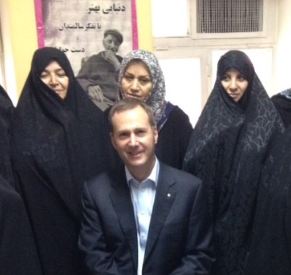
Australia could learn from Iran’s transformed health care system and its successful integration of medical education and public health services, according to eminent primary health care expert Professor Michael Kidd.
Professor Kidd, Executive Dean of the Faculty of Medicine, Nursing and Health Sciences at Flinders University, has recently returned from a World Health Organisation-led mission to Iran to examine the country’s world-renowned public health care system.
“Between 1984 and 2000 Iran was able to halve its infant mortality rate, raise immunisation rates from 20 per cent to over 95 per cent and implement a highly successful program of family planning,” said Professor Kidd, who is also a GP and President of the World Organisation of Family Doctors (WONCA).
Professor Kidd said Iran’s outstanding achievements in the provision of health care services were largely a result of the Iranian Government’s creation in 1985 of a single Ministry of Health and Medical Education.
“The chancellor of medical sciences at each university in Iran is responsible for not just the training of the next generation of health care professionals and overseeing health and medical research, but also the delivery of clinical services throughout public hospitals and primary care clinics,” he said.
“This allows far greater integration between the functions of universities and health services than exists in many other countries. Some of the chancellors are responsible for the health care services provided to over five million people.
“This system is now being looked at closely by other countries to see if this might provide some ways of reducing duplication and waste, and to improve the involvement of universities across health services and enhance their ability to translate research findings very quickly to benefit the care being provided to people.”
Professor Kidd said Iran, which provides all public primary care services free of charge, had achieved “universal health coverage” through the training and support of a nationwide network of community health workers, known as behvarz.
The behvarz are people from rural communities who link people living within their region to doctors and nurses working in local health units.
“Everybody in Iran gets access to health care regardless of their ability to pay, and this is a country of 78 million people,” he said.
“The behvarz are people based in villages who have a basic level of training, but who provide a fantastic service to the local community. As a result of that system there’s been marked improvements to the health care provided to all people in that country, especially the poor people and the people in rural areas.”
However Professor Kidd said Iran’s public health care system did have its shortcomings, with the country recognising the need to strengthen primary care through the specialty of family medicine.
“They have very strong teaching hospitals and a base of community workers, but what they’re missing at the moment is strong general practice, so having well trained specialist GPs based in the communities working with their community health workers to provide first contact care will reduce the number of people referring themselves to emergency departments or to consultant specialists and overcrowding hospitals.”
Professor Kidd said the Iranian health care practitioners and educators he met during his week-long visit were “genuinely excited” following the recent United Nations announcement of a nuclear accord and potential lifting of long-standing sanctions against Iran.
“It’s been hard to get equipment and medications and for people to gain the training and experience which benefit us so much here in our own health care system. However, they are very resourceful people who have replaced a lot of things that were missing by taking it on themselves.”

